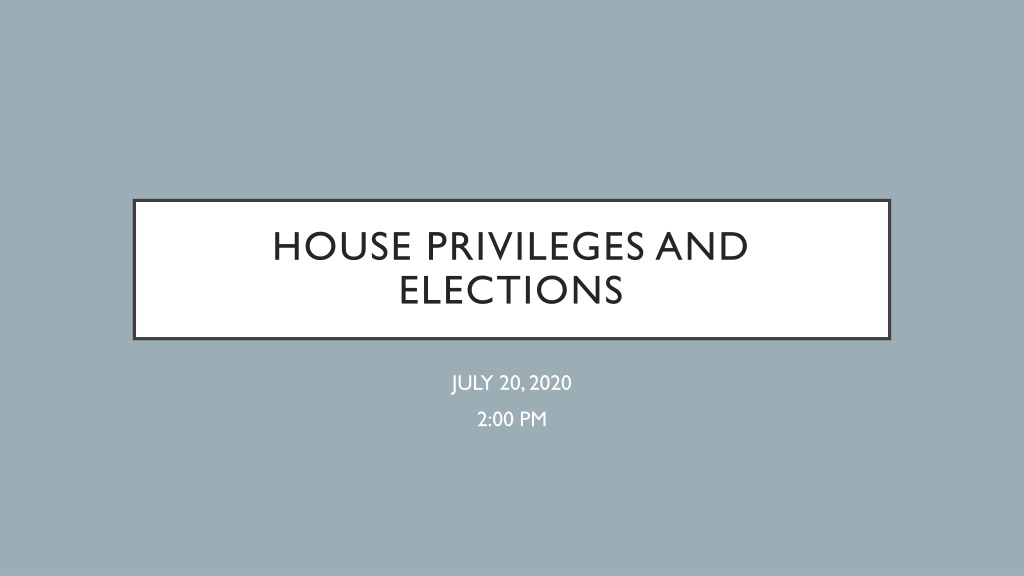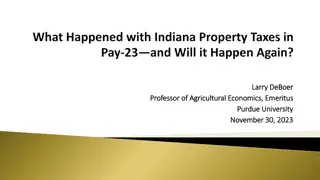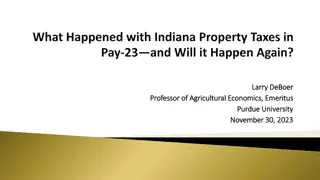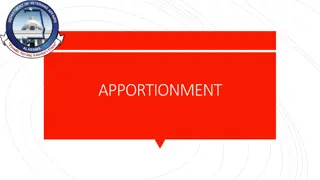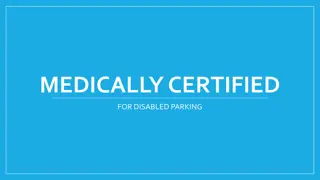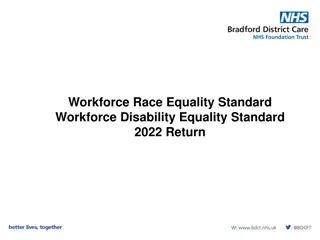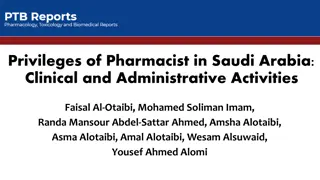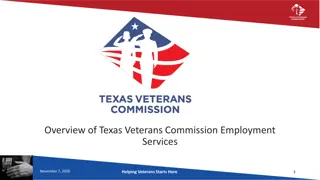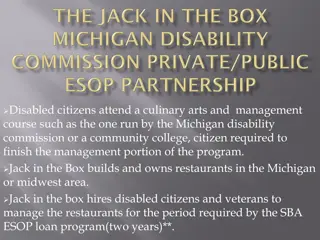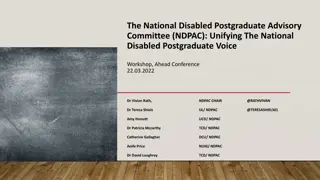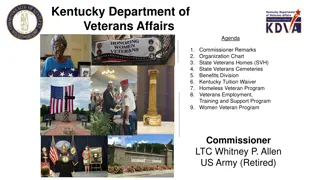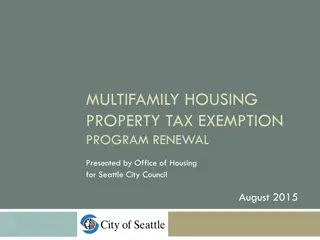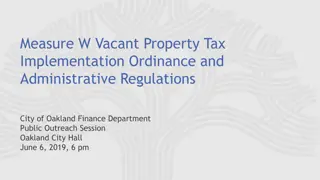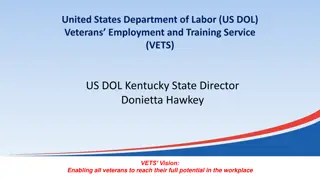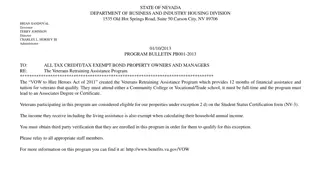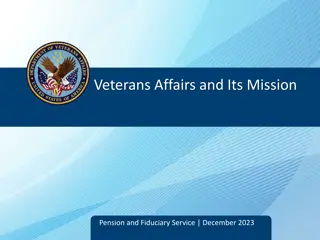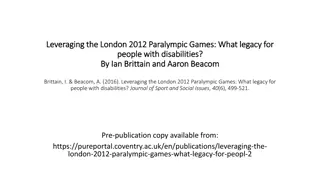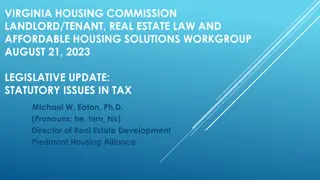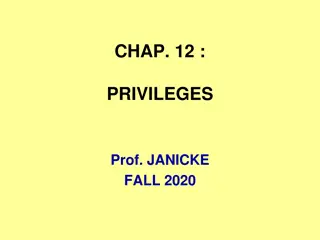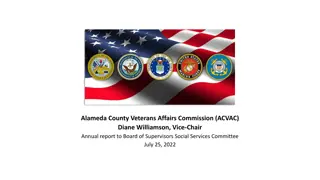House Privileges and Elections Meeting Agenda for July 20, 2020 - Property Tax Exemption Proposal for Disabled Veterans
The House Privileges and Elections meeting agenda includes discussions on proposed constitutional amendments related to property tax exemption for disabled veterans and the Virginia Redistricting Commission. The meeting will review explanations and ballot questions, such as HJ.103 which proposes a tax exemption for motor vehicles owned by disabled veterans. The draft explanation details the impact of the proposed amendment on state and local taxation for eligible veterans and their spouses.
Download Presentation

Please find below an Image/Link to download the presentation.
The content on the website is provided AS IS for your information and personal use only. It may not be sold, licensed, or shared on other websites without obtaining consent from the author. Download presentation by click this link. If you encounter any issues during the download, it is possible that the publisher has removed the file from their server.
E N D
Presentation Transcript
HOUSE PRIVILEGES AND ELECTIONS JULY 20, 2020 2:00 PM
AGENDA I. CALL TO ORDER II. APPROVAL OF EXPLANATION FOR CONSTITUTIONAL AMENDMENT RELATED TO A PROPERTY TAX EXEMPTION FOR A MOTOR VEHICLE OWNED BY CERTAIN DISABLED VETERANS III. REVIEW OF EXPLANATION FOR PROPOSED AMENDMENT RELATED TO THE VIRGINIA REDISTRICTING COMMISSION IV. ADJOURNMENT
CODE OF VIRGINIA 30-19.9 The explanation shall contain the ballot question, the full text of the proposed constitutional amendment, and a statement of not more than 500 words on the proposed amendment.The explanation shall be presented in plain English,shall be limited to a neutral explanation, which may include a brief statement on the effect of a "yes" and "no" vote on the question but shall not include arguments submitted by either proponents or opponents of the proposal.
HJ 103: PERSONAL PROPERTY TAX EXEMPTION FOR A MOTOR VEHICLE OWNED BY CERTAIN DISABLED VETERANS Should an automobile or pickup truck that is owned and used primarily by or for a veteran of the United States armed forces or the Virginia National Guard who has a one hundred percent service-connected, permanent, and total disability be free from state and local taxation? BALLOT QUESTION (HB 1268; ACTS OF ASSEMBLY CH. 540)
DRAFT EXPLANATION WORD COUNT: 311/500 Present Law Generally, the Constitution of Virginia requires all property be taxed. However, there are certain types of property that the Constitution specifically says is not subject to taxation. Proposed Amendment This amendment would add to the list of property that is not subject to state or local taxation one motor vehicle owned and used primarily by or for a veteran of the United States armed forces or the Virginia National Guard who has a one hundred percent (100%) service-connected, permanent, and total disability. The amendment says that motor vehicle means an automobile or pickup truck. The motor vehicle would be exempt from taxation beginning on the date the veteran gets the motor vehicle or January 1, 2021, whichever is later. A veteran who claims this tax exemption would not get back any taxes paid on his motor vehicle prior to January 1, 2021. Under this amendment, a motor vehicle that is owned by the spouse of a veteran of the United States armed forces or the Virginia National Guard with a one hundred percent (100%) service-connected, permanent, and total disability could also be free from taxation. The General Assembly is allowed to pass a law that places conditions or restrictions on this exemption. A "yes" vote will mean the Constitution of Virginia will be amended to exempt one automobile or pickup truck that is owned and used primarily by or for a veteran of the United States armed forces or the Virginia National Guard who has a one hundred percent (100%) service-connected, permanent, and total disability from state and local taxation. A "no" vote will leave the Constitution of Virginia unchanged and automobiles and pickup trucks owned and used primarily by or for a veteran of the United States armed forces or the Virginia National Guard who has a one hundred percent (100%) service-connected, permanent, and total disability will continue to be subject to state and local taxes.
SJ 18: VIRGINIA REDISTRICTING COMMISSION Should the Constitution of Virginia be amended to establish a redistricting commission, consisting of eight members of the General Assembly and eight citizens of the Commonwealth, that is responsible for drawing the congressional and state legislative districts that will be subsequently voted on, but not changed by,the General Assembly and enacted without the Governor's involvement and to give the responsibility of drawing districts to the Supreme Court of Virginia if the redistricting commission fails to draw districts or the GeneralAssembly fails to enact districts by certain deadlines? BALLOT QUESTION (SB 236; ACTS OF ASSEMBLY CH. 1071)
DRAFT EXPLANATION APPROVED BY SENATE P&E WORD COUNT: 489/500 Current Law Under current law, the General Assembly is responsible for drawing new election districts for the U.S. House of Representatives, the state Senate, and the House of Delegates. These districts are required to be compact and contiguous,and to have populations that are equal to each other. Proposed Law The proposed amendment would shift the responsibility of drawing these election districts from the General Assembly to a bipartisan commission, made up of 16 persons, half being members of the General Assembly and half being citizens of the Commonwealth.This commission would draw the election districts for the U.S.House of Representatives,the state Senate, and the House of Delegates and then submit the maps to the General Assembly for approval. If the commissioners are unable to agree on proposals for maps by a certain date, or if the General Assembly does not approve the submitted maps by a certain date, the commission is allotted additional time to draw new districts, but if maps are not then submitted or approved,the Supreme Court ofVirginia becomes responsible for drawing these election districts. The eight legislative commissioners are appointed by the political party leadership in the state Senate and the House of Delegates, with an equal number from each house and from each major political party. The eight citizen commissioners are picked by a committee of five retired circuit court judges. Four of the retired judges are selected by party leaders in the Senate and the House from a list compiled by the Chief Justice of the Supreme Court of Virginia. These four judges pick the fifth judge from the same list. This selection committee then chooses citizen commissioners from lists created by party leaders in the Senate and the House. Members and employees of Congress or the General Assembly cannot be citizen commissioners. Each party leader in each house gives the selection committee a list of at least 16 candidates,and the committee picks two from each list for a total of eight citizen commissioners. For a plan to be submitted for the General Assembly s approval, at least six of the eight citizen commissioners and at least six of the eight legislative commissioners must agree to it. Additionally, for plans for General Assembly districts to be submitted, at least three of the four Senators on the commission have to agree to the Senate districts plan and at least three of the four Delegates on the commission have to agree to the House of Delegates districts plan. The General Assembly cannot make any changes to these plans, and the Governor cannot veto any plan approved by the GeneralAssembly. The amendment also adds a requirement that districts provide,where practicable,opportunities for racial and ethnic communities to elect candidates of their choice. A yes vote will make a bipartisan commission responsible for the initial drawing of election districts. A no vote will leave the sole responsibility for drawing the districts with the GeneralAssembly.
LEVINE BALLOT QUESTION ALTERNATIVES Should the Constitution of Virginia be amended to establish a redistricting commission, consisting of eight members of the General Assembly and eight citizens of the Commonwealth selected by the party leaders of the General Assembly, that is responsible for drawing the congressional and state legislative districts that will be subsequently voted on, but not changed by, the General Assembly without the involvement of the Governor, and to give the responsibility of drawing districts to the Supreme Court of Virginia (whose members were appointed by the General Assembly) if the redistricting commission fails to draw districts; if the General Assembly fails to enact districts by certain deadlines; or if any two delegates or two senators or three citizens object to the state plan; or if three legislators or three citizens object to the federal plan? Should Virginia s Constitution be amended to require, starting in 2021,new congressional and state legislative districts be established involvement by either (1) a redistricting commission of legislators and citizens selected by leaders of both major parties in the General Assembly and whose maps must be approved by the General Assembly, or (2) the Virginia Supreme Court, if two legislators on the commission object or if a supermajority of the commission and the General Assembly cannot agree by certain deadlines? without the Governor s
LEVINE PROPOSAL EXPLANATION WORD COUNT 498/500 Current Law The United States Constitution requires election districts for the U.S.House of Representatives,theVirginia Senate,and theVirginia House of Delegates be redrawn every ten years.The Virginia Constitution currently requires those districts be established by the General Assembly and the Governor according to law. Current law requires each district be compact and contiguous,with equal population among districts as practicable and no undue favoritism to any political party. Proposed Law The proposed Virginia constitutional amendment would require the four major party leaders in the House and Senate to each select two legislators from their respective legislative bodies and political parties,to serve on the commission.Each legislative leader would also select 16 citizens,from whom a total of eight would be chosen by retired circuit court judges to serve with the eight legislators on the commission. This 16-member commission would redraw election districts for the Virginia Senate and the House of Delegates, unless objected to by any (a) two senators, (b) two delegates, or (c) three citizens on the panel. The commission would also redraw election districts for the U.S. House of Representatives, unless three legislators or three citizens on the panel object. If any of these objections are maintained,theVirginia Supreme Court would establish the districts instead. Unless objected to, commission maps would be submitted to the General Assembly, which may approve or disapprove the maps without amendment. The Governor may not veto or otherwise participate in the plan. If the General Assembly approves the maps, they are enacted. If the General Assembly disapproves the maps, the process is retried a second time. As before, if a sufficient objection is made or a supermajority of the commission and the General Assembly cannot agree within strict timelines, the maps would be established by the Virginia Supreme Court. The Virginia Supreme Court consists of seven justices appointed and reappointed by the Virginia General Assembly to staggered 12-year terms over the preceding 12 years. The proposed amendment does not set any standards constraining how the Virginia Supreme Court would establish legislative districts, nor does it restrict or prohibit political gerrymandering by the court. But the amendment does require, consistent with federal law, that districts provide, where practicable, opportunities for racial and ethnic communities to elect candidates of their choice.Absent racial gerrymandering,the Virginia Supreme Court would be the sole determinant of the districts it establishes.There is no provision for appeal or subsequent review. A yes vote would transfer the establishment of election districts to either a supermajority of a bipartisan commission chosen by party leaders (if they timely agree on maps with the GeneralAssembly);or to theVirginia Supreme Court (if they don t). A no vote would leave responsibility for drawing the districts with the General Assembly and the Governor,who could either redraw district lines themselves or enact a law requiring an independent commission or special master draw election districts pursuant to designated criteria,which currently include not unduly favoring or disfavoring any political party.
